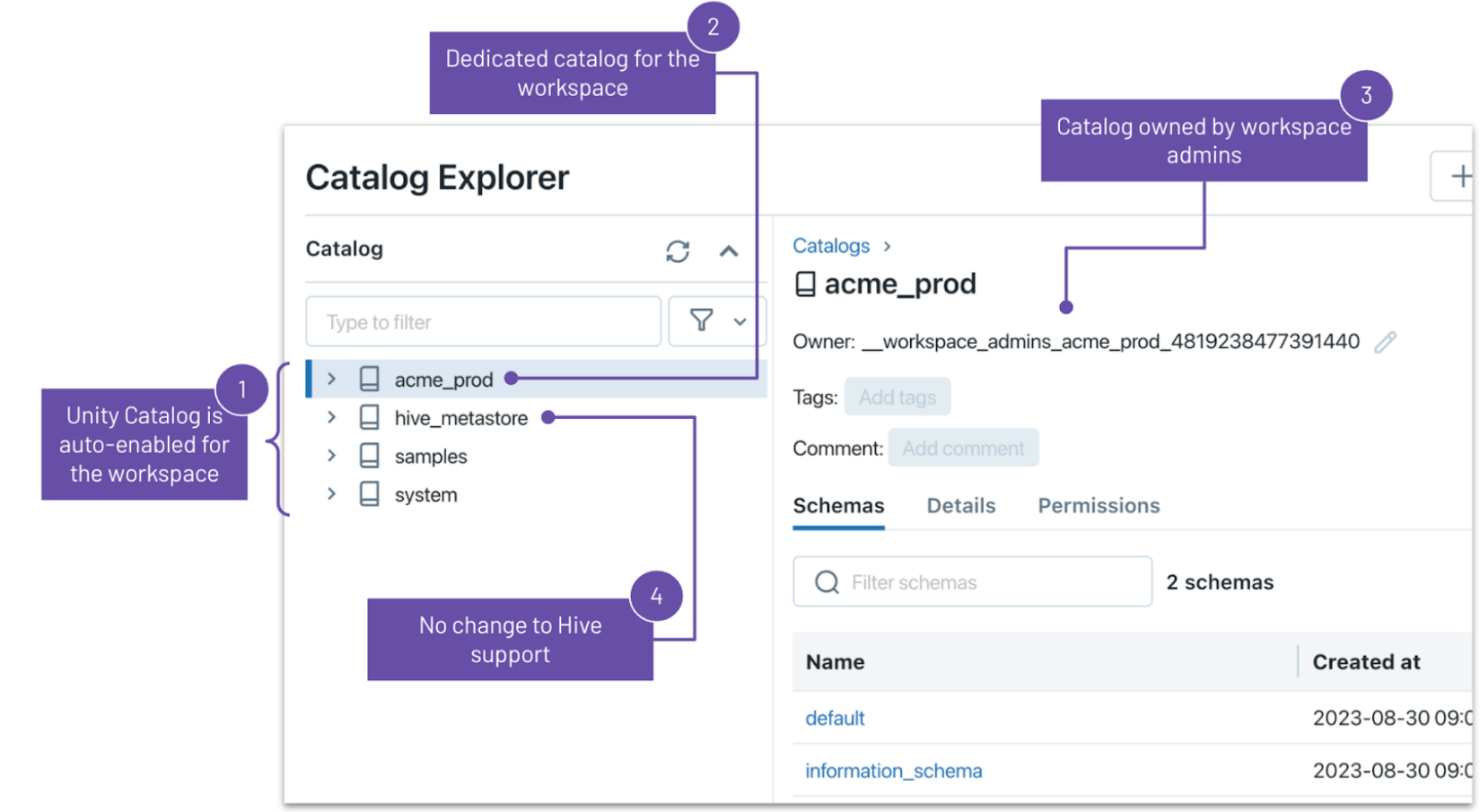Built-In Governance for Your Databricks Workspace

Databricks Unity Catalog simplifies data and AI governance by providing a unified solution for organizations to securely discover, access, monitor, and collaborate on a range of data and AI assets. This includes tables, ML models, files and functions, ultimately boosting productivity and unlocking the full potential of the Lakehouse environment.
Today, we're excited to announce that Unity Catalog is now pre-configured and accessible in new premium workspaces on AWS and Azure, marking a significant milestone in our journey. Rollout for this feature will proceed gradually across accounts and regions. Reach out to your account representative for more details.
Overview of your workspace preconfigured with Unity Catalog
You’ll notice a few new features in your workspace.

- The workspace now arrives with pre-configured access to Unity Catalog! No need for subsequent enablement steps by an account admin.
- You’ll find a catalog named after your workspace (‘acme prod’ in this example). This catalog serves as a place for you to put your data and AI assets, such as tables, models, files, and functions. This catalog uses cloud storage dedicated to your workspace to store underlying data.
- The catalog is owned by the admins of the workspace, meaning they can further administer it. For example, they can create ‘schemas’ within the catalog to further organize assets and choose who can add assets to those schemas.Within the catalog you’ll find a schema called ‘default’ in which all workspace users can create assets (These permissions can be refined by the workspace admin if desired).
- This release builds on previous versions of Databricks and still arrives pre-configured with access to a Hive metastore. You can nominate the catalog that your workspace will use by default via a new setting called ‘Default catalog for the workspace’ (AWS | Azure).
3 things you should try today with Unity Catalog!
Now that your workspace has access to Unity Catalog, a whole host of features become available to you! Here are three things that you should try today using the notebook!
Create a catalog of your organization’s data and AI assets and share them securely
Democratizing data and AI requires ensuring the accessibility and security of data and AI assets. Unity Catalog simplifies this process by providing users with a central hub for effortlessly managing their data and AI resources. This empowers users to generate tables, AI models, functions, and files and catalog them in one place while maintaining access controls and auditability.
Watch the demo below to see how you can register data and AI assets and define access permissions.
Explore real-time data lineage
Gartner®: Databricks Cloud Database Leader
Unity Catalog offers real-time inference of data lineage for all your workloads, down to the column level. This feature helps you build trust in your data and AI assets, conduct impact analysis, and fuel data discovery for your end users
Watch the demo below to see data lineage in action.
Apply fine-grained row and column-level security
Unity Catalog streamlines access policy administration, enabling the creation of fine-grained permissions at both row and column levels for your Databricks workloads. Its cloud-agnostic SQL-based interface ensures a straightforward and user-friendly experience. Explore the guides (AWS, Azure, and GCP) to learn more about row filters and column masks in Unity Catalog.
Watch the demo below to see column-masking in Unity Catalog.
Looking for more resources?
By adopting Unity Catalog as the cornerstone of your Lakehouse architecture, you unlock the potential of a flexible and scalable governance solution that spans your entire data and AI ecosystem. For comprehensive documentation, refer to the Unity Catalog guides available for AWS, Azure, and GCP. For additional tutorials, please visit Databricks Demo Center for more tutorials on Unity Catalog. Download the free eBook on Data and AI governance to learn more about how Databricks Lakehouse Platform addresses data and AI governance challenges.
Never miss a Databricks post
What's next?

Product
November 21, 2024/3 min read

